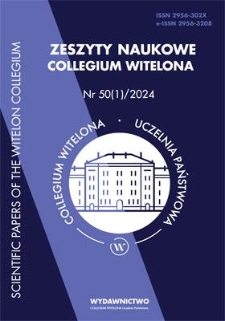Dolnośląska Biblioteka Cyfrowa udostępnia 110 315 obiektów cyfrowych
Obiekt
Tytuł: The problem of loneliness and coping with stress in the context of life situations experienced by war refugees (based on the research conducted in Rivne, Ukraine)
Tytuł odmienny:
Autor:
Petrenko, Oksana ; Balika, Liudmyla ; Koval, Kateryna
Współtwórca:
Fortuna, Małgorzata. Redakcja ; Wierzbicka, Monika. Redakcja
Opis:
Zeszyty Naukowe Collegium Witelona, nr 50(1)/2024, s. 69-96
Abstrakt:
Wydawca:
Wydawnictwo Collegium Witelona Uczelnia Państwowa
Miejsce wydania:
Data wydania:
Typ zasobu:
Identyfikator zasobu:
doi:10.5604/01.3001.0054.7526 ; oai:dbc.wroc.pl:128608
Język:
Powiązania:
Zeszyty Naukowe Państwowej Wyższej Szkoły Zawodowej im. Witelona w Legnicy ; Zeszyty Naukowe Collegium Witelona ; Zeszyty Naukowe Collegium Witelona, nr 50(1)/2024
Prawa:
Wszystkie prawa zastrzeżone (Copyright)
Prawa dostępu:
Dla wszystkich w zakresie dozwolonego użytku
Lokalizacja oryginału:
Tytuł publikacji grupowej:
Kolekcje, do których przypisany jest obiekt:
- Dolnośląska Biblioteka Cyfrowa > Uczestnicy Konsorcjum > 18. Collegium Witelona Uczelnia Państwowa
- Dolnośląska Biblioteka Cyfrowa > Zasoby > 2. Czasopisma > Czasopisma współczesne
- Dolnośląska Biblioteka Cyfrowa > Dziedziny nauki > 5. Nauki społeczne
- Dolnośląska Biblioteka Cyfrowa > Dziedziny nauki > 3. Nauki medyczne i nauki o zdrowiu
Data ostatniej modyfikacji:
14 lis 2024
Data dodania obiektu:
14 lis 2024
Liczba wyświetleń treści obiektu:
58
Wszystkie dostępne wersje tego obiektu:
https://dbc.wroc.pl/publication/167125
Wyświetl opis w formacie RDF:
Wyświetl opis w formacie OAI-PMH:
Obiekty Podobne
Podoliak, Natalia Stets, Valentyna Fortuna, Małgorzata. Redakcja Wierzbicka, Monika. Redakcja
Borczykowska-Rzepka, Maria Rurka, Justyna Fortuna, Marysia. Redakcja Wierzbicka, Monika. Redakcja
Skwarek, Beata Lozynska, Iryna Budka, Jan. Redakcja
Kotarski, Hubert
Mołek-Winiarska, Dorota
Żarczyńska-Dobiesz, Agnieszka
Pytel, Sławomir Jankowski, Grzegorz
























